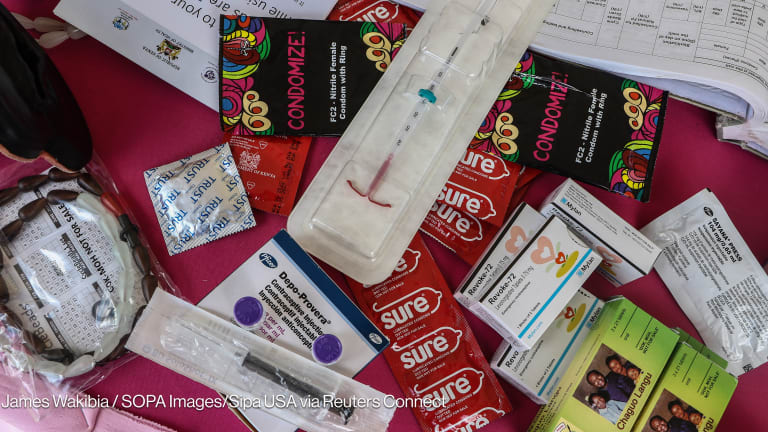
NEW YORK/WASHINGTON — President-elect Joe Biden is expected to repeal the Mexico City Policy as one of his early acts in office. But a memorandum rescinding the policy — which has been expanded during President Donald Trump’s administration — is only the start of what’s needed to reverse its impacts, according to experts.
“We have every reason to believe this policy will be lifted almost immediately with the Biden-Harris administration, but I think that what you are going to see is the impacts don’t immediately go away,” said Nina Besser Doorley, associate director of advocacy and policy at the International Women’s Health Coalition.
The “global gag rule,” or Mexico City Policy, states that foreign NGOs that receive any U.S. global health funding are prohibited from engaging in abortion-related activities, including providing counseling or education. The policy has been shown to hamper sexual and reproductive health services around the world, and has also stopped or reduced the work of implementing partners of U.S.-backed HIV-programming, recent findings show.
In Malawi, Trump’s global gag rule creates culture of intimidation
The impacts of the restrictive policy have reached far beyond sexual and reproductive health in the southeast African country, according to advocates.
The Trump administration enacted the policy in January 2017, and later expanded it to cover all global health assistance — not just family planning funding. If the Biden administration rescinds the policy within its first few days of days, it would follow the precedent of previous Democrat presidents.
But the likely policy reversal won’t result in automatic change, according to Jen Kates, senior vice president and director of global health and HIV policy at the Henry J. Kaiser Family Foundation. She described the process as the “worst game of telephone tag.” Word that the U.S. will again offer global health funding to INGOs that engage in abortion work will take time to reach a “small, foreign NGO working in one corner of a country,” Kates explained.
Other experts also told Devex that even once the policy is rescinded there will still be a lot of work the administration needs to do.
While there is a sense of urgency to “get the policy out of global health funding and work to make sure there are no unnecessary delays,” reversing all elements of the policy will take time, said Serra Sippel, the president of the Center for Health and Gender Equity, CHANGE.
In Washington, relevant agencies — including the U.S. Agency for International Development, the State Department, Department of Health and Human Services, and the Department of Defense — will have to revise standard provisions and remove the language from contracts and communicate the changes to the NGOs they work with, Sippel said.
“We still have partners who are fearful, who have been chilled by enforcement of the policy, who are leery of what they can and cannot do,” said Jonathan Rucks, senior director of policy and advocacy at PAI.
Providing in-country training, offering clear communication from missions, and rebuilding partnerships will all be important in changing the environment, Sippel and Rucks said.
The process of getting funding to organizations that wouldn’t accept the global gag rule will be slow, several experts told Devex. Any big organizations will have to wait until the next cycle of projects they can bid on. And while smaller organizations may get funding once again as subgrantees, scaling up hiring, opening new clinics, or expanding programs will take time, they said.
“Organizations that have chosen to stop U.S. funding, or stop abortion services, or chosen not to apply for U.S. funding, will need to make the decision: Do I want to get back in the game or not?”
— Jen Kates, senior vice president and global health director, Henry J. Kaiser Family FoundationThat is, if they choose to seek U.S. funding again.
“Organizations that have chosen to stop U.S. funding, or stop abortion services, or chosen not to apply for U.S. funding, will need to make the decision: Do I want to get back in the game or not?” Kates said.
MSI Reproductive Choice, formerly known as Marie Stopes International, was one of the few large international NGOs that publicly refused U.S. funding rather than comply with the “global gag rule” along with the International Planned Parenthood Federation.
MSI is still considering whether or not it will again seek U.S. funding if the policy is reversed and the funding becomes available, Sarah Shaw, MSI’s head of advocacy told Devex. MSI is also prepared for the possibility that the rule can again be reinstated in four or eight years, if a Republican again is elected president in the U.S.
There has been an effort by Democrats in Congress to permanently eliminate the Mexico City policy, including through the Global HER Act introduced in 2019, but its prospects remain uncertain — especially with the potential for a divided Congress.
While the policy has been in place, there has been a constant concern for MSI partners that they could jeopardize the work of other organizations funded by USAID. A Kenyan MSI partner, for instance, now doesn’t sign into country-level family planning working group meetings so that USAID-funded partners in attendance can’t be accused of supporting a “noncompliant NGO,” Shaw said.
MSI’s decision to go without U.S. funding reduced its donor income by 17%, or $30 million. That money would have allowed it to reach an additional 8 million women and girls with sexual and reproductive health services, and would have prevented an estimated 6 million unintended pregnancies, in addition to 1.8 million unsafe abortions, according to Shaw.
“Definitely the generosity of other donors kicked in, but it is different, and you find that it comes with different service priorities, or geographical priorities,” Shaw explained. “The disruption of cutting services, or having to temporarily reduce services and then reconfigure them to fit the priorities of a different donor is incredibly disruptive to services. It is not a smooth transition.”
The Trump administration may still take action to further expand the Mexico City Policy, which it calls the Protecting Life in Global Health Assistance Policy, in the next couple months — a move experts said would further complicate a Biden administration’s efforts to reverse course.
In September the Trump administration issued a proposed rule about the PLGHA policy that would make it applicable to foreign contractors in addition to foreign NGOs. The public comment period for the rule closed on Nov. 13, and the comments will now be reviewed and “considered in the formation of the final rule,” according to the federal register.
If the Trump administration pushes through the new rule — it is unclear if it will do so — language related to the PLGHA policy will be included in contracts, and the rule would have to be rewritten and go through the relevant rulemaking process to be reversed, which could take time.
“It would add time and confusion to partners operating with contracts that have the rule,” Rucks said. “Let’s be clear about why the Trump administration is doing it. They are seeing the writing on the wall and want to muck things up and cause confusion and chaos.”









